Reflective Journal: Personal & Professional Development BA Business
VerifiedAdded on 2023/06/14
|7
|2079
|460
Journal and Reflective Writing
AI Summary
This reflective journal explores personal and professional development through the lens of the Gibbs Reflective Cycle. The author reflects on their experiences as a business and management student, focusing on a group project related to professional development skills. The journal details the student's feelings, evaluations, and analysis of the experience, highlighting both strengths and weaknesses. Key employability skills such as communication, teamwork, and time management are identified, along with areas for improvement like research and problem-solving. A Personal Development Plan (PDP) is outlined to address these weaknesses. The journal concludes with a summary of lessons learned and the importance of continuous self-assessment for future career growth. Desklib offers similar solved assignments and past papers for students.
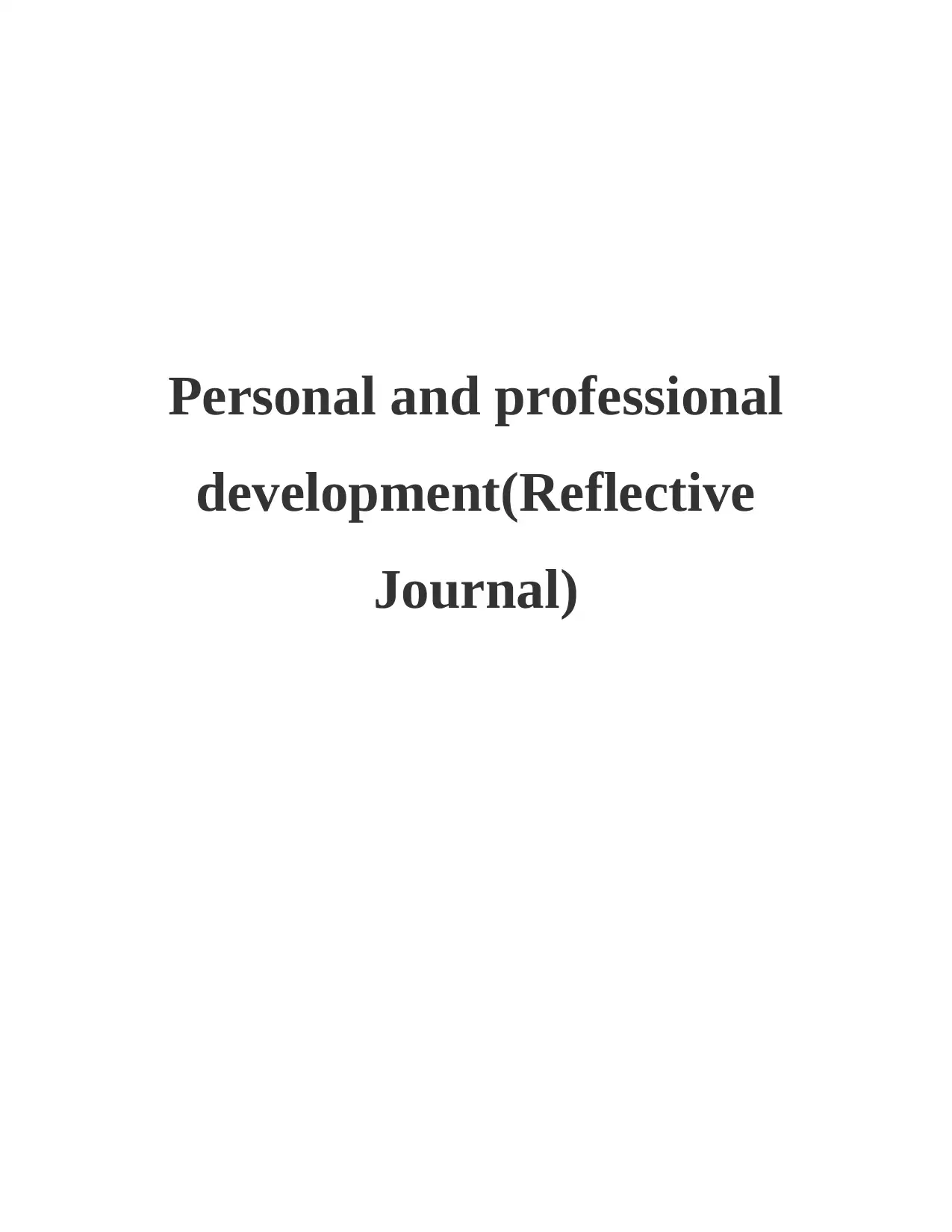
Personal and professional
development(Reflective
Journal)
development(Reflective
Journal)
Paraphrase This Document
Need a fresh take? Get an instant paraphrase of this document with our AI Paraphraser
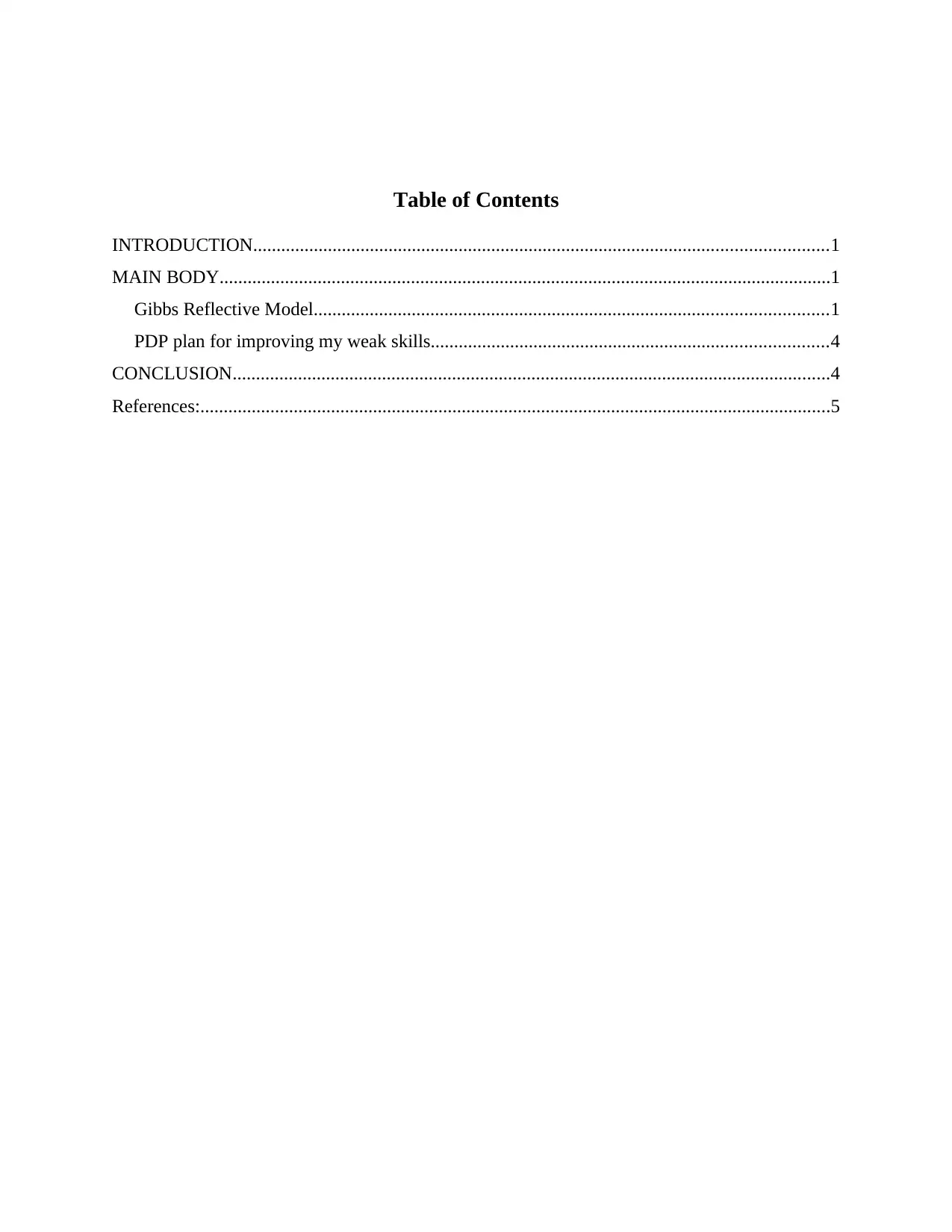
Table of Contents
INTRODUCTION...........................................................................................................................1
MAIN BODY...................................................................................................................................1
Gibbs Reflective Model..............................................................................................................1
PDP plan for improving my weak skills.....................................................................................4
CONCLUSION................................................................................................................................4
References:.......................................................................................................................................5
INTRODUCTION...........................................................................................................................1
MAIN BODY...................................................................................................................................1
Gibbs Reflective Model..............................................................................................................1
PDP plan for improving my weak skills.....................................................................................4
CONCLUSION................................................................................................................................4
References:.......................................................................................................................................5
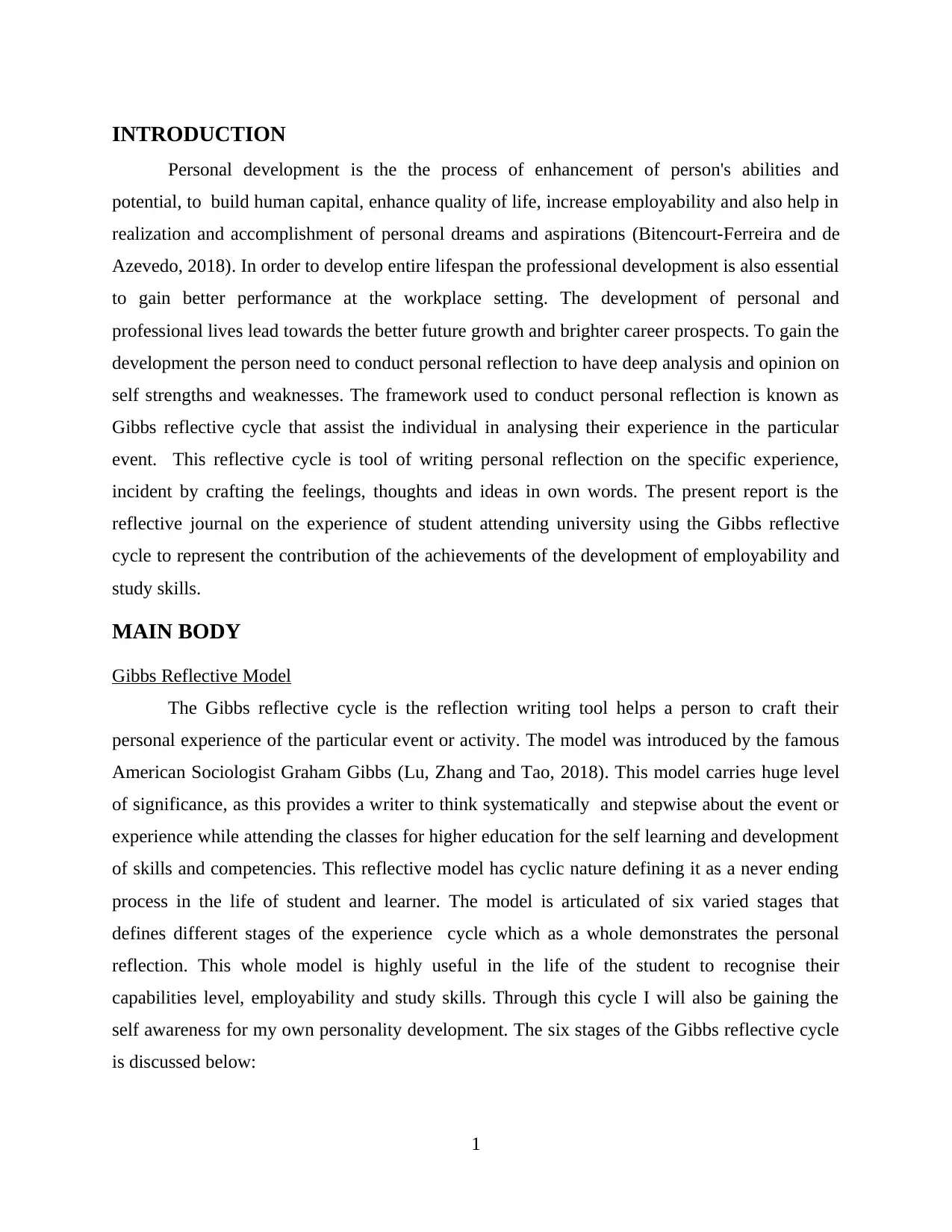
INTRODUCTION
Personal development is the the process of enhancement of person's abilities and
potential, to build human capital, enhance quality of life, increase employability and also help in
realization and accomplishment of personal dreams and aspirations (Bitencourt-Ferreira and de
Azevedo, 2018). In order to develop entire lifespan the professional development is also essential
to gain better performance at the workplace setting. The development of personal and
professional lives lead towards the better future growth and brighter career prospects. To gain the
development the person need to conduct personal reflection to have deep analysis and opinion on
self strengths and weaknesses. The framework used to conduct personal reflection is known as
Gibbs reflective cycle that assist the individual in analysing their experience in the particular
event. This reflective cycle is tool of writing personal reflection on the specific experience,
incident by crafting the feelings, thoughts and ideas in own words. The present report is the
reflective journal on the experience of student attending university using the Gibbs reflective
cycle to represent the contribution of the achievements of the development of employability and
study skills.
MAIN BODY
Gibbs Reflective Model
The Gibbs reflective cycle is the reflection writing tool helps a person to craft their
personal experience of the particular event or activity. The model was introduced by the famous
American Sociologist Graham Gibbs (Lu, Zhang and Tao, 2018). This model carries huge level
of significance, as this provides a writer to think systematically and stepwise about the event or
experience while attending the classes for higher education for the self learning and development
of skills and competencies. This reflective model has cyclic nature defining it as a never ending
process in the life of student and learner. The model is articulated of six varied stages that
defines different stages of the experience cycle which as a whole demonstrates the personal
reflection. This whole model is highly useful in the life of the student to recognise their
capabilities level, employability and study skills. Through this cycle I will also be gaining the
self awareness for my own personality development. The six stages of the Gibbs reflective cycle
is discussed below:
1
Personal development is the the process of enhancement of person's abilities and
potential, to build human capital, enhance quality of life, increase employability and also help in
realization and accomplishment of personal dreams and aspirations (Bitencourt-Ferreira and de
Azevedo, 2018). In order to develop entire lifespan the professional development is also essential
to gain better performance at the workplace setting. The development of personal and
professional lives lead towards the better future growth and brighter career prospects. To gain the
development the person need to conduct personal reflection to have deep analysis and opinion on
self strengths and weaknesses. The framework used to conduct personal reflection is known as
Gibbs reflective cycle that assist the individual in analysing their experience in the particular
event. This reflective cycle is tool of writing personal reflection on the specific experience,
incident by crafting the feelings, thoughts and ideas in own words. The present report is the
reflective journal on the experience of student attending university using the Gibbs reflective
cycle to represent the contribution of the achievements of the development of employability and
study skills.
MAIN BODY
Gibbs Reflective Model
The Gibbs reflective cycle is the reflection writing tool helps a person to craft their
personal experience of the particular event or activity. The model was introduced by the famous
American Sociologist Graham Gibbs (Lu, Zhang and Tao, 2018). This model carries huge level
of significance, as this provides a writer to think systematically and stepwise about the event or
experience while attending the classes for higher education for the self learning and development
of skills and competencies. This reflective model has cyclic nature defining it as a never ending
process in the life of student and learner. The model is articulated of six varied stages that
defines different stages of the experience cycle which as a whole demonstrates the personal
reflection. This whole model is highly useful in the life of the student to recognise their
capabilities level, employability and study skills. Through this cycle I will also be gaining the
self awareness for my own personality development. The six stages of the Gibbs reflective cycle
is discussed below:
1
⊘ This is a preview!⊘
Do you want full access?
Subscribe today to unlock all pages.

Trusted by 1+ million students worldwide
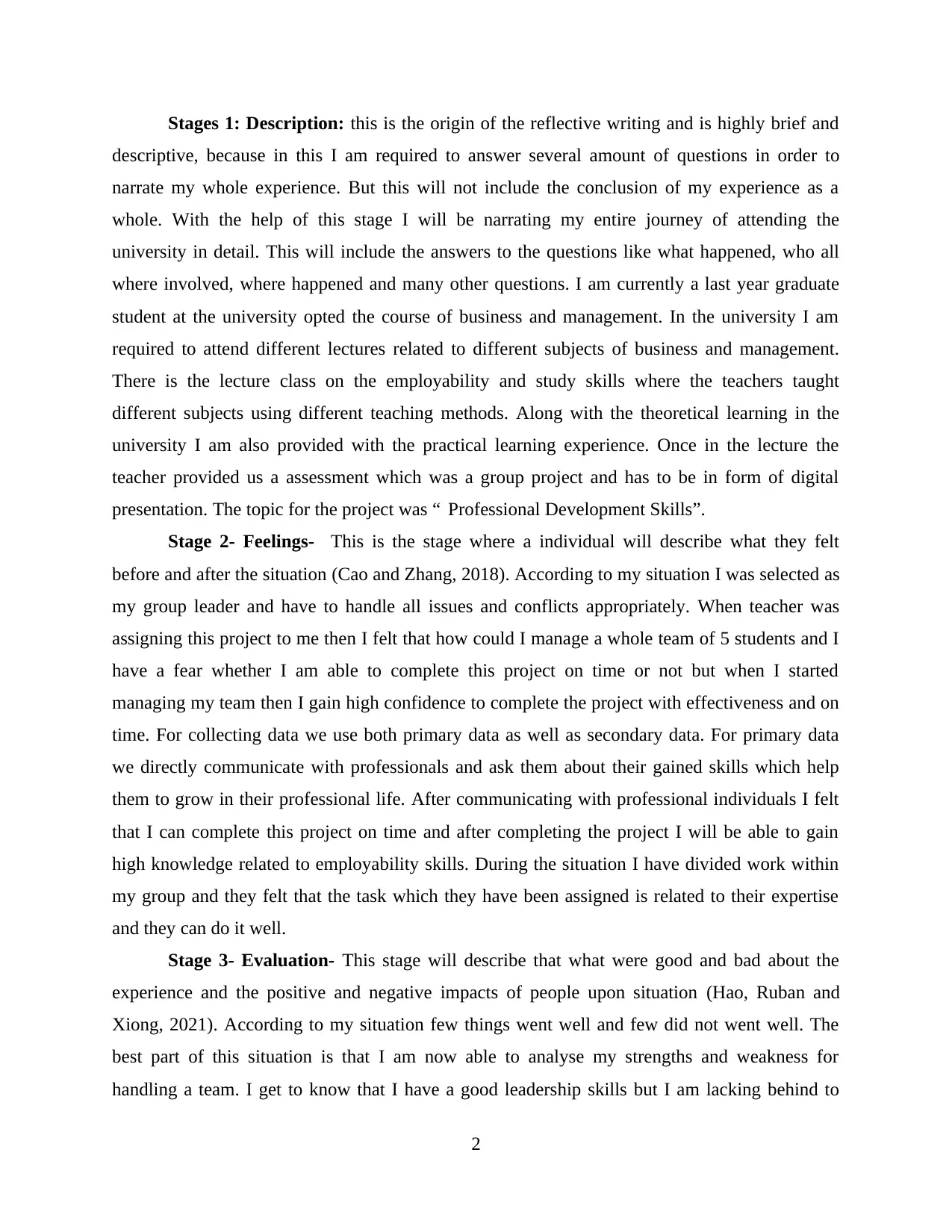
Stages 1: Description: this is the origin of the reflective writing and is highly brief and
descriptive, because in this I am required to answer several amount of questions in order to
narrate my whole experience. But this will not include the conclusion of my experience as a
whole. With the help of this stage I will be narrating my entire journey of attending the
university in detail. This will include the answers to the questions like what happened, who all
where involved, where happened and many other questions. I am currently a last year graduate
student at the university opted the course of business and management. In the university I am
required to attend different lectures related to different subjects of business and management.
There is the lecture class on the employability and study skills where the teachers taught
different subjects using different teaching methods. Along with the theoretical learning in the
university I am also provided with the practical learning experience. Once in the lecture the
teacher provided us a assessment which was a group project and has to be in form of digital
presentation. The topic for the project was “ Professional Development Skills”.
Stage 2- Feelings- This is the stage where a individual will describe what they felt
before and after the situation (Cao and Zhang, 2018). According to my situation I was selected as
my group leader and have to handle all issues and conflicts appropriately. When teacher was
assigning this project to me then I felt that how could I manage a whole team of 5 students and I
have a fear whether I am able to complete this project on time or not but when I started
managing my team then I gain high confidence to complete the project with effectiveness and on
time. For collecting data we use both primary data as well as secondary data. For primary data
we directly communicate with professionals and ask them about their gained skills which help
them to grow in their professional life. After communicating with professional individuals I felt
that I can complete this project on time and after completing the project I will be able to gain
high knowledge related to employability skills. During the situation I have divided work within
my group and they felt that the task which they have been assigned is related to their expertise
and they can do it well.
Stage 3- Evaluation- This stage will describe that what were good and bad about the
experience and the positive and negative impacts of people upon situation (Hao, Ruban and
Xiong, 2021). According to my situation few things went well and few did not went well. The
best part of this situation is that I am now able to analyse my strengths and weakness for
handling a team. I get to know that I have a good leadership skills but I am lacking behind to
2
descriptive, because in this I am required to answer several amount of questions in order to
narrate my whole experience. But this will not include the conclusion of my experience as a
whole. With the help of this stage I will be narrating my entire journey of attending the
university in detail. This will include the answers to the questions like what happened, who all
where involved, where happened and many other questions. I am currently a last year graduate
student at the university opted the course of business and management. In the university I am
required to attend different lectures related to different subjects of business and management.
There is the lecture class on the employability and study skills where the teachers taught
different subjects using different teaching methods. Along with the theoretical learning in the
university I am also provided with the practical learning experience. Once in the lecture the
teacher provided us a assessment which was a group project and has to be in form of digital
presentation. The topic for the project was “ Professional Development Skills”.
Stage 2- Feelings- This is the stage where a individual will describe what they felt
before and after the situation (Cao and Zhang, 2018). According to my situation I was selected as
my group leader and have to handle all issues and conflicts appropriately. When teacher was
assigning this project to me then I felt that how could I manage a whole team of 5 students and I
have a fear whether I am able to complete this project on time or not but when I started
managing my team then I gain high confidence to complete the project with effectiveness and on
time. For collecting data we use both primary data as well as secondary data. For primary data
we directly communicate with professionals and ask them about their gained skills which help
them to grow in their professional life. After communicating with professional individuals I felt
that I can complete this project on time and after completing the project I will be able to gain
high knowledge related to employability skills. During the situation I have divided work within
my group and they felt that the task which they have been assigned is related to their expertise
and they can do it well.
Stage 3- Evaluation- This stage will describe that what were good and bad about the
experience and the positive and negative impacts of people upon situation (Hao, Ruban and
Xiong, 2021). According to my situation few things went well and few did not went well. The
best part of this situation is that I am now able to analyse my strengths and weakness for
handling a team. I get to know that I have a good leadership skills but I am lacking behind to
2
Paraphrase This Document
Need a fresh take? Get an instant paraphrase of this document with our AI Paraphraser
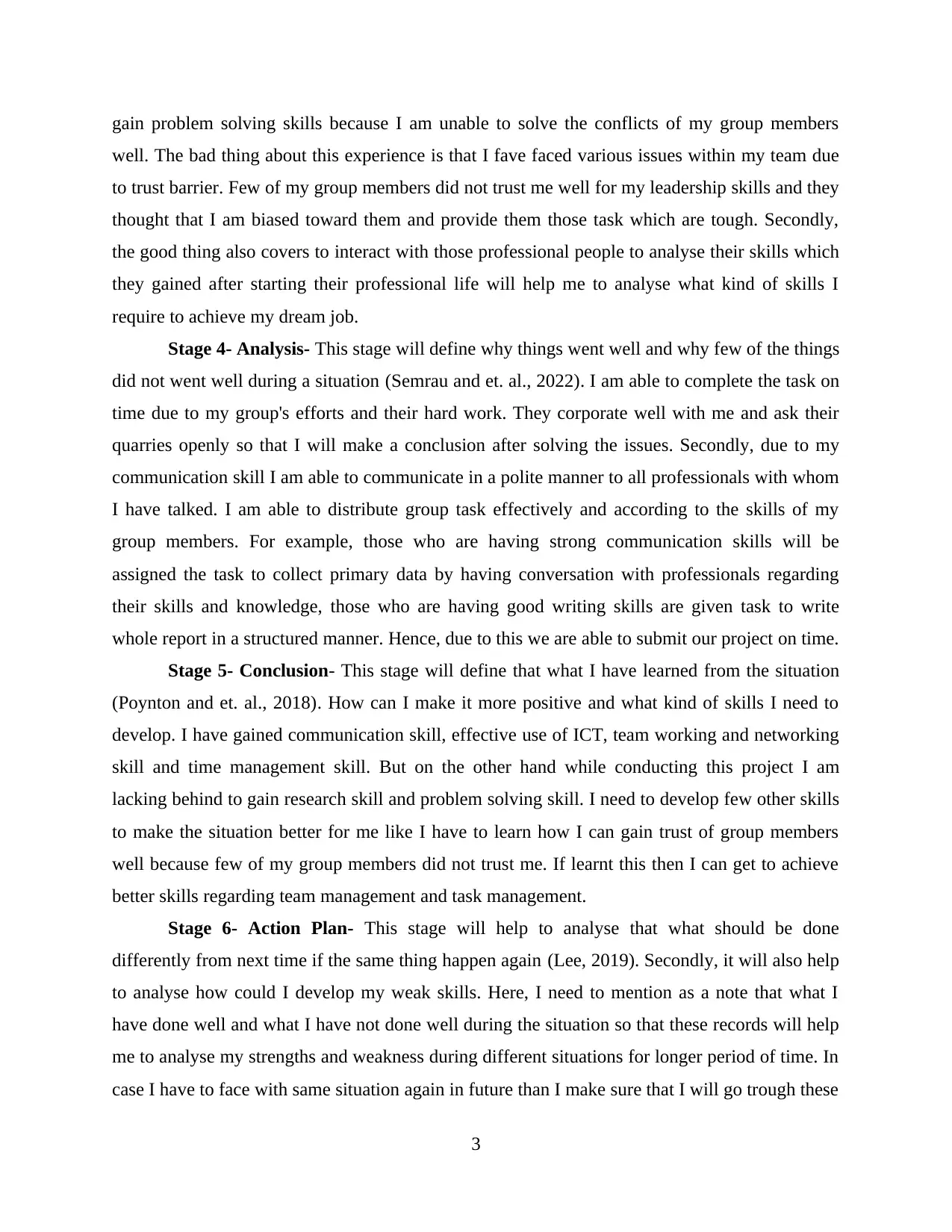
gain problem solving skills because I am unable to solve the conflicts of my group members
well. The bad thing about this experience is that I fave faced various issues within my team due
to trust barrier. Few of my group members did not trust me well for my leadership skills and they
thought that I am biased toward them and provide them those task which are tough. Secondly,
the good thing also covers to interact with those professional people to analyse their skills which
they gained after starting their professional life will help me to analyse what kind of skills I
require to achieve my dream job.
Stage 4- Analysis- This stage will define why things went well and why few of the things
did not went well during a situation (Semrau and et. al., 2022). I am able to complete the task on
time due to my group's efforts and their hard work. They corporate well with me and ask their
quarries openly so that I will make a conclusion after solving the issues. Secondly, due to my
communication skill I am able to communicate in a polite manner to all professionals with whom
I have talked. I am able to distribute group task effectively and according to the skills of my
group members. For example, those who are having strong communication skills will be
assigned the task to collect primary data by having conversation with professionals regarding
their skills and knowledge, those who are having good writing skills are given task to write
whole report in a structured manner. Hence, due to this we are able to submit our project on time.
Stage 5- Conclusion- This stage will define that what I have learned from the situation
(Poynton and et. al., 2018). How can I make it more positive and what kind of skills I need to
develop. I have gained communication skill, effective use of ICT, team working and networking
skill and time management skill. But on the other hand while conducting this project I am
lacking behind to gain research skill and problem solving skill. I need to develop few other skills
to make the situation better for me like I have to learn how I can gain trust of group members
well because few of my group members did not trust me. If learnt this then I can get to achieve
better skills regarding team management and task management.
Stage 6- Action Plan- This stage will help to analyse that what should be done
differently from next time if the same thing happen again (Lee, 2019). Secondly, it will also help
to analyse how could I develop my weak skills. Here, I need to mention as a note that what I
have done well and what I have not done well during the situation so that these records will help
me to analyse my strengths and weakness during different situations for longer period of time. In
case I have to face with same situation again in future than I make sure that I will go trough these
3
well. The bad thing about this experience is that I fave faced various issues within my team due
to trust barrier. Few of my group members did not trust me well for my leadership skills and they
thought that I am biased toward them and provide them those task which are tough. Secondly,
the good thing also covers to interact with those professional people to analyse their skills which
they gained after starting their professional life will help me to analyse what kind of skills I
require to achieve my dream job.
Stage 4- Analysis- This stage will define why things went well and why few of the things
did not went well during a situation (Semrau and et. al., 2022). I am able to complete the task on
time due to my group's efforts and their hard work. They corporate well with me and ask their
quarries openly so that I will make a conclusion after solving the issues. Secondly, due to my
communication skill I am able to communicate in a polite manner to all professionals with whom
I have talked. I am able to distribute group task effectively and according to the skills of my
group members. For example, those who are having strong communication skills will be
assigned the task to collect primary data by having conversation with professionals regarding
their skills and knowledge, those who are having good writing skills are given task to write
whole report in a structured manner. Hence, due to this we are able to submit our project on time.
Stage 5- Conclusion- This stage will define that what I have learned from the situation
(Poynton and et. al., 2018). How can I make it more positive and what kind of skills I need to
develop. I have gained communication skill, effective use of ICT, team working and networking
skill and time management skill. But on the other hand while conducting this project I am
lacking behind to gain research skill and problem solving skill. I need to develop few other skills
to make the situation better for me like I have to learn how I can gain trust of group members
well because few of my group members did not trust me. If learnt this then I can get to achieve
better skills regarding team management and task management.
Stage 6- Action Plan- This stage will help to analyse that what should be done
differently from next time if the same thing happen again (Lee, 2019). Secondly, it will also help
to analyse how could I develop my weak skills. Here, I need to mention as a note that what I
have done well and what I have not done well during the situation so that these records will help
me to analyse my strengths and weakness during different situations for longer period of time. In
case I have to face with same situation again in future than I make sure that I will go trough these
3
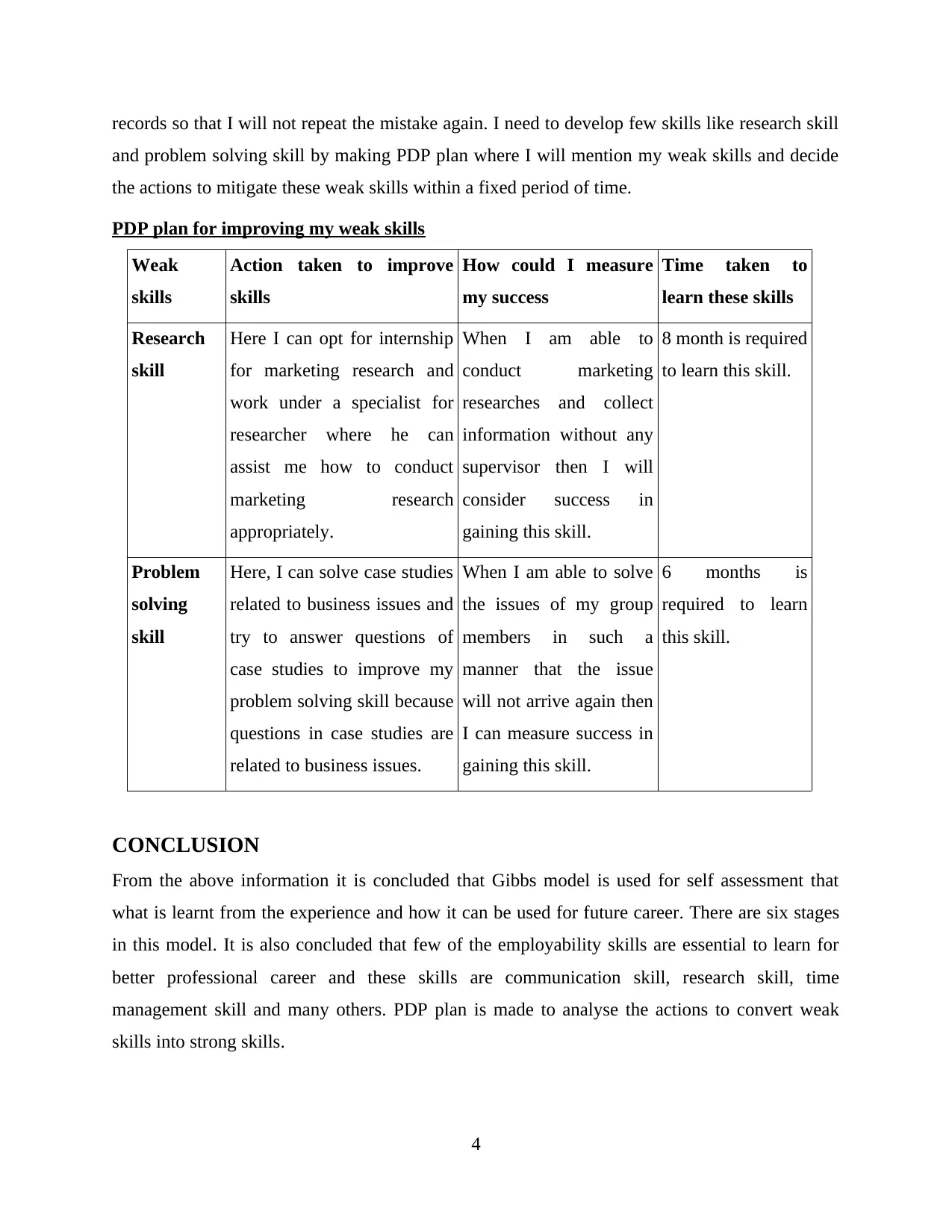
records so that I will not repeat the mistake again. I need to develop few skills like research skill
and problem solving skill by making PDP plan where I will mention my weak skills and decide
the actions to mitigate these weak skills within a fixed period of time.
PDP plan for improving my weak skills
Weak
skills
Action taken to improve
skills
How could I measure
my success
Time taken to
learn these skills
Research
skill
Here I can opt for internship
for marketing research and
work under a specialist for
researcher where he can
assist me how to conduct
marketing research
appropriately.
When I am able to
conduct marketing
researches and collect
information without any
supervisor then I will
consider success in
gaining this skill.
8 month is required
to learn this skill.
Problem
solving
skill
Here, I can solve case studies
related to business issues and
try to answer questions of
case studies to improve my
problem solving skill because
questions in case studies are
related to business issues.
When I am able to solve
the issues of my group
members in such a
manner that the issue
will not arrive again then
I can measure success in
gaining this skill.
6 months is
required to learn
this skill.
CONCLUSION
From the above information it is concluded that Gibbs model is used for self assessment that
what is learnt from the experience and how it can be used for future career. There are six stages
in this model. It is also concluded that few of the employability skills are essential to learn for
better professional career and these skills are communication skill, research skill, time
management skill and many others. PDP plan is made to analyse the actions to convert weak
skills into strong skills.
4
and problem solving skill by making PDP plan where I will mention my weak skills and decide
the actions to mitigate these weak skills within a fixed period of time.
PDP plan for improving my weak skills
Weak
skills
Action taken to improve
skills
How could I measure
my success
Time taken to
learn these skills
Research
skill
Here I can opt for internship
for marketing research and
work under a specialist for
researcher where he can
assist me how to conduct
marketing research
appropriately.
When I am able to
conduct marketing
researches and collect
information without any
supervisor then I will
consider success in
gaining this skill.
8 month is required
to learn this skill.
Problem
solving
skill
Here, I can solve case studies
related to business issues and
try to answer questions of
case studies to improve my
problem solving skill because
questions in case studies are
related to business issues.
When I am able to solve
the issues of my group
members in such a
manner that the issue
will not arrive again then
I can measure success in
gaining this skill.
6 months is
required to learn
this skill.
CONCLUSION
From the above information it is concluded that Gibbs model is used for self assessment that
what is learnt from the experience and how it can be used for future career. There are six stages
in this model. It is also concluded that few of the employability skills are essential to learn for
better professional career and these skills are communication skill, research skill, time
management skill and many others. PDP plan is made to analyse the actions to convert weak
skills into strong skills.
4
⊘ This is a preview!⊘
Do you want full access?
Subscribe today to unlock all pages.

Trusted by 1+ million students worldwide
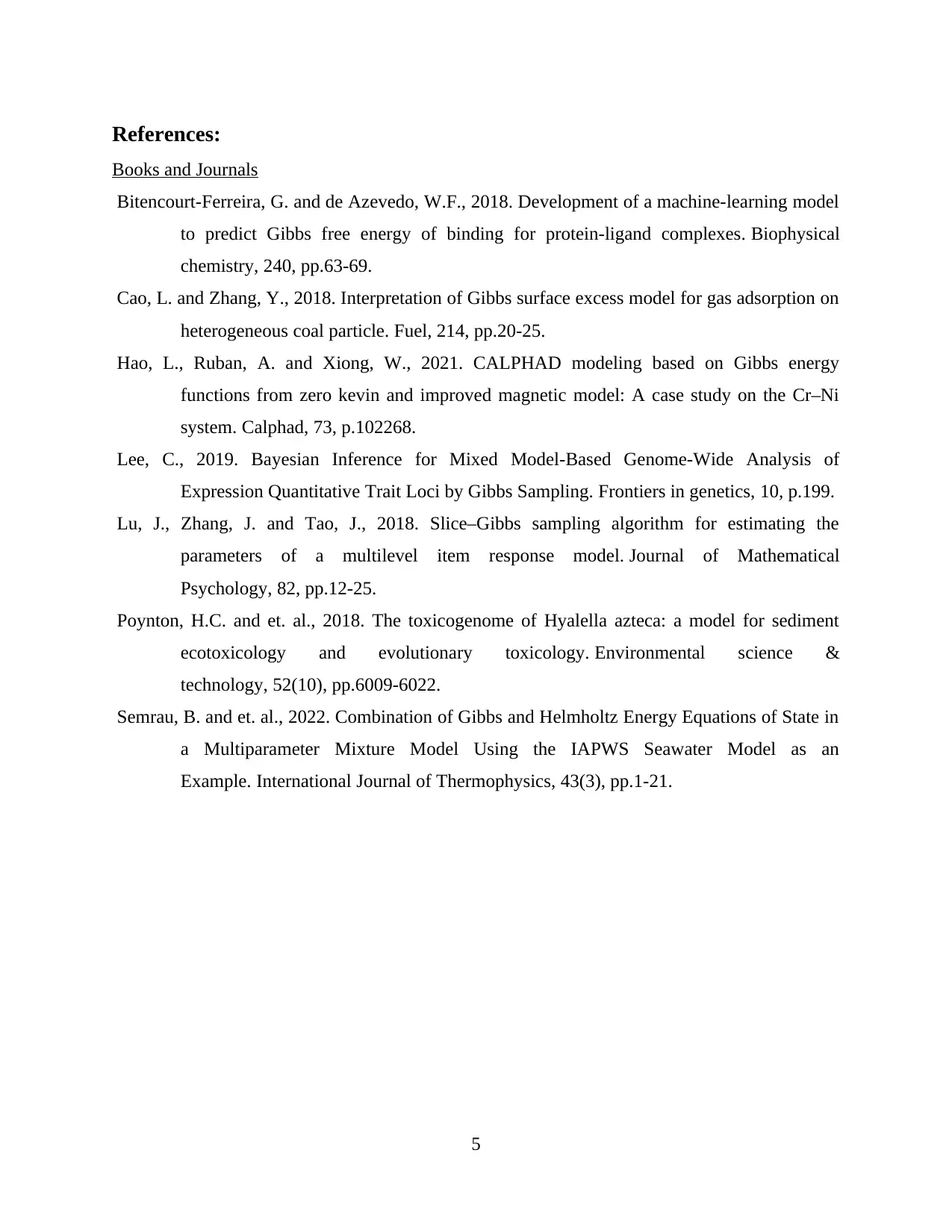
References:
Books and Journals
Bitencourt-Ferreira, G. and de Azevedo, W.F., 2018. Development of a machine-learning model
to predict Gibbs free energy of binding for protein-ligand complexes. Biophysical
chemistry, 240, pp.63-69.
Cao, L. and Zhang, Y., 2018. Interpretation of Gibbs surface excess model for gas adsorption on
heterogeneous coal particle. Fuel, 214, pp.20-25.
Hao, L., Ruban, A. and Xiong, W., 2021. CALPHAD modeling based on Gibbs energy
functions from zero kevin and improved magnetic model: A case study on the Cr–Ni
system. Calphad, 73, p.102268.
Lee, C., 2019. Bayesian Inference for Mixed Model-Based Genome-Wide Analysis of
Expression Quantitative Trait Loci by Gibbs Sampling. Frontiers in genetics, 10, p.199.
Lu, J., Zhang, J. and Tao, J., 2018. Slice–Gibbs sampling algorithm for estimating the
parameters of a multilevel item response model. Journal of Mathematical
Psychology, 82, pp.12-25.
Poynton, H.C. and et. al., 2018. The toxicogenome of Hyalella azteca: a model for sediment
ecotoxicology and evolutionary toxicology. Environmental science &
technology, 52(10), pp.6009-6022.
Semrau, B. and et. al., 2022. Combination of Gibbs and Helmholtz Energy Equations of State in
a Multiparameter Mixture Model Using the IAPWS Seawater Model as an
Example. International Journal of Thermophysics, 43(3), pp.1-21.
5
Books and Journals
Bitencourt-Ferreira, G. and de Azevedo, W.F., 2018. Development of a machine-learning model
to predict Gibbs free energy of binding for protein-ligand complexes. Biophysical
chemistry, 240, pp.63-69.
Cao, L. and Zhang, Y., 2018. Interpretation of Gibbs surface excess model for gas adsorption on
heterogeneous coal particle. Fuel, 214, pp.20-25.
Hao, L., Ruban, A. and Xiong, W., 2021. CALPHAD modeling based on Gibbs energy
functions from zero kevin and improved magnetic model: A case study on the Cr–Ni
system. Calphad, 73, p.102268.
Lee, C., 2019. Bayesian Inference for Mixed Model-Based Genome-Wide Analysis of
Expression Quantitative Trait Loci by Gibbs Sampling. Frontiers in genetics, 10, p.199.
Lu, J., Zhang, J. and Tao, J., 2018. Slice–Gibbs sampling algorithm for estimating the
parameters of a multilevel item response model. Journal of Mathematical
Psychology, 82, pp.12-25.
Poynton, H.C. and et. al., 2018. The toxicogenome of Hyalella azteca: a model for sediment
ecotoxicology and evolutionary toxicology. Environmental science &
technology, 52(10), pp.6009-6022.
Semrau, B. and et. al., 2022. Combination of Gibbs and Helmholtz Energy Equations of State in
a Multiparameter Mixture Model Using the IAPWS Seawater Model as an
Example. International Journal of Thermophysics, 43(3), pp.1-21.
5
1 out of 7
Related Documents
Your All-in-One AI-Powered Toolkit for Academic Success.
+13062052269
info@desklib.com
Available 24*7 on WhatsApp / Email
![[object Object]](/_next/static/media/star-bottom.7253800d.svg)
Unlock your academic potential
Copyright © 2020–2026 A2Z Services. All Rights Reserved. Developed and managed by ZUCOL.



